 ith no streetlights and its row of abandoned late-Ottoman-era buildings, the Beirut neighborhood of Khandaq al-Ghamiq seems to live up to its Arabic name, “the dark ditch.” It is home to some of the city’s poorest residents, many displaced by war, squatting for decades in crumbling, shell-pierced dwellings.
ith no streetlights and its row of abandoned late-Ottoman-era buildings, the Beirut neighborhood of Khandaq al-Ghamiq seems to live up to its Arabic name, “the dark ditch.” It is home to some of the city’s poorest residents, many displaced by war, squatting for decades in crumbling, shell-pierced dwellings.
But on a recent evening in March, the Khandaq was lit up with a bright white party tent. Valets lined up outside and Arabic beats pulsated from within. Inside, amid a cacophony of excited conversations, a hip young Lebanese band remixed traditional melodies while Beirut’s finest restaurants served up steaks imported from Australia, gourmet Black Angus burgers and artisan cold-press juices. The attendees were smartly dressed in “dotcom casual”—suits open to ironic T-shirts, Converse sneakers and jeans—many still wearing bright yellow lanyards branded “ArabNet.”
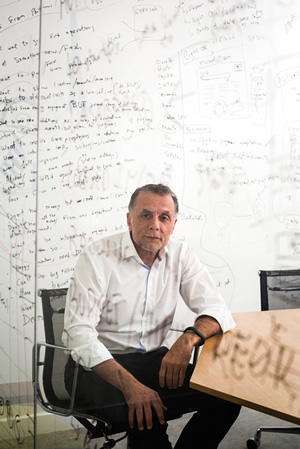 |
| Aramex founder and ceo Fadi Ghandour has emerged as a key investor in the region’s growing technology sector, having helped launch several major startups and venture-capital funds. He serves as chairman of leading regional tech news site wamda.com, and he is now partnering with the United Nations to fund 200 “microbusinesses” in his native Jordan. |
The three-day conference, now in its fifth year, is one of the largest gatherings of the Middle East’s budding startup industry, and tonight’s dinner was one of the many afterparties where the region’s future business leaders get to network and capitalize on a regional e-commerce market that will be worth $15 billion by 2015, according to estimates by PayPal.
If all goes according to plan, much of the shrapnel-scarred Khandaq area will be transformed too, into the Beirut Digital District, a 10-year initiative to build some 10 high-rises that planners hope will house the new industry just a few blocks from the luxury glass-and-steel residential towers now going up in downtown Beirut. Subsidized Wi-Fi and fiber optic cables are expected to flow freely throughout the area, which aims to rival similar new regional facilities like Oasis500 in Jordan or Flat6Labs in Egypt, which have been hosting, training and investing in hundreds of tech-based startups, buoyed by millions of dollars in new venture capital funds that are cropping up across the region.
Hours before the party, a scale model of the Digital District was on display at ArabNet, held in a sprawling banquet hall in Beirut’s newest Hilton hotel. With the backdrop of a 14-meter (45') electronic display, dozens of young, aspiring entrepreneurs from across the Arab world took to the stage to deliver two-minute “Ideathon” pitches with infomercial-like zeal to the crowd of some 600 it professionals. More-established ceos were also on hand, speaking at panels covering everything from social-media marketing to venture-capital opportunities to forging links with Silicon Valley. There was a brief discussion of Bitcoin, as well as corporate social responsibility, better known by its industry buzzword, csr.
“Why do csr?” asked twenty-something digital-media strategist Ralf Aoun as he paced the stage with a headset microphone. “It’s good for business, good for pr and good for karma!”
But what about regional turmoil, asked moderator and industry veteran Mike Butcher, who was making his third visit to ArabNet as editor of TechCrunch, one of the world’s most popular technology news sites. He put the question also to co-panelist Stephanie Holden, formerly of Priceline and Walt Disney and now the head of Saudi-owned television giant mbc’s investment arm, mbc Ventures. Touting her firm’s investments in nine Arab startups, she said regional entrepreneurs faced more of a threat from government bureaucracy than armed violence. Butcher himself had come to a similar—if blunter—conclusion the previous evening at another off-ArabNet event.
“Amid everything going on, you guys are still kicking ass,” he said to cheers from an audience that had gathered at Coworking 961, yet another technology incubator space in Beirut. Butcher had been one of the judges at a pitching contest at the space, which occupies the guesthouse of a 19th-century palace. Under its castle-like turrets, the representatives of young Lebanese firms had presented their ideas on a projection screen in the garden, a rare patch of lush greenery in the exhaust-choked city.
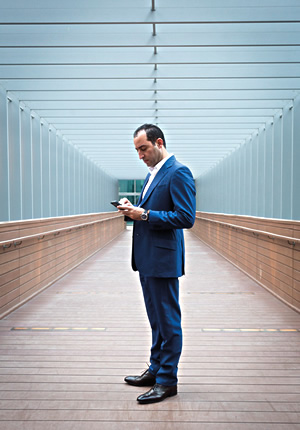 |
| Known for sealing the biggest Middle East tech deal to date, Samih Toukan cofounded the first major Arabic-language Internet provider, Maktoob.com, which sold in 2009 for some $175 million. More recently, his investment firm has acquired Souq.com, the region’s largest online retailer. |
The winners that evening were the developers behind Roadie Tuner, a handheld piece of hardware that tunes guitars and other stringed instruments. It was born out of the frustration faced by 27-year-old engineer Bassam Jalgha while tuning his ‘ud, or Arab lute. In 2009, Jalgha had entered and won the mbc reality-tv show for innovators, “Stars of Science,” walking away with a check for $300,000 from the Qatar Foundation. He would later team up with friend, fellow engineer and flute player Hassane Slaibi and launch a Kickstarter crowdfunding campaign that netted nearly $180,000—three times their stated target. Jalgha has since traveled to China to oversee the first batch of production, and he expects Roadie Tuner to hit stores sometime this summer.
“I don’t think you guys need any help from us,” said Butcher after awarding the duo tickets and a table at the 2014 TechCrunch Disrupt event in New York City. “Awesome job.”
Taking second prize at the challenge was Ki, a plug-in usb security device that reads a user’s fingerprint with both security algorithms and biometrics developed in Beirut. “That seems like overkill,” said one of the judges. “Why not buy the technology from the us?” “What guarantees that the nsa hasn’t tampered with it?” rejoined the twenty-something developer, to laughs from the crowd. The judges also rewarded Jihad Kawas, who was pitching an app that connects buyers and sellers of used items within close proximity. This wasn’t Kawas’s first app, and he is 17.
Of course, many of Lebanon’s most successful developers no longer need to pitch at such events.
Twenty-six-year-old Hind Hobeika has already raised over $1 million in investment capital for her hardware innovation, Instabeat, which had just won a 2014 design and engineering award at the Consumer Electronics Show in Las Vegas. The product is the first waterproof, goggles-mounted heart-rate monitor, which allows swimmers to hone their workouts and also track their performance after a swim. Hobeika, a former varsity swimmer and engineering student at the American University of Beirut, saw the need for such a device when she couldn’t find it in stores. After more than two years of development and nine prototypes, production is scheduled to begin this summer, and Hobeika is negotiating distribution deals in the us and Australia.
Still other products have already gone to market, many in the form of mobile apps. Perhaps the most successful of these has been Poo, a virtual pet users can feed, stroke, buy gifts for and watch grow. Created by 24-year-old Paul Salameh, the application has proven viral. In press interviews, Salameh has claimed up to 300,000 downloads per day, with Poo having reached the number-one spot in the kids’ games category at app stores in more than 65 countries. Revenues will likely soar with in-app purchases to feed and dress your Poo, available from $1 to $11. YouTube videos celebrating the game in various languages have seen millions of views while Poo’s Facebook page has garnered more than five million likes.
But runaway success stories like this are still somewhat rare in the region, where the tech industry is still understandably finding its feet after barely a decade of existence. And developments in Lebanon, as one of the Arab world’s smallest countries, amount to just a fraction of the region’s newest industry.
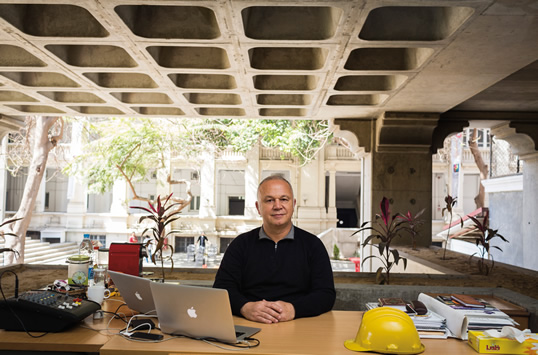 |
| Ahmed Alfi returned to Cairo in 2006 and in 2011 launched one of the region’s best-known incubator spaces, Flat6Labs. He is now remodeling part of the former campus of the American University of Cairo to become Egypt’s largest technology park. “Everyone knows my main goal is collaboration,” he says. |
 here have been few opportunities in the Arab tech industry like that which was seized by Jordanian Samih Toukan. After completing his mba in London, Toukan went on to work as an it consultant for Andersen Consulting in Amman, but sensing demand, he left the job in the mid-1990’s to start his own business. Toukan had made a proposal to one of his former Andersen clients, fellow Jordanian Fadi Ghandour, ceo of Aramex, the region’s largest courier service. Internet penetration was still nascent in the region, and very little of it was in Arabic. The solution seems obvious today: Create Arabic content and an email server for its readers. And by the late 1990’s Toukan did just that by launching Maktoob.com.
here have been few opportunities in the Arab tech industry like that which was seized by Jordanian Samih Toukan. After completing his mba in London, Toukan went on to work as an it consultant for Andersen Consulting in Amman, but sensing demand, he left the job in the mid-1990’s to start his own business. Toukan had made a proposal to one of his former Andersen clients, fellow Jordanian Fadi Ghandour, ceo of Aramex, the region’s largest courier service. Internet penetration was still nascent in the region, and very little of it was in Arabic. The solution seems obvious today: Create Arabic content and an email server for its readers. And by the late 1990’s Toukan did just that by launching Maktoob.com.
As a first market entrant, the site exploded from 100,000 users in 2000 to 10 million by 2005. Yahoo bought the company in 2008 for $175 million. It was the kind of “exit” or sell-off that gave impetus to the regional industry.
“Before that exit, the industry was nonexistent. Maktoob was a turning point,” says Toukan from his new offices in Dubai. “It was the beginning of the industry. After that exit we saw an acceleration of ideas and investment.”
Toukan, Ghandour and a handful of others have grown into major drivers of that trend. The proceeds from the Maktoob deal helped Toukan launch Jabbar Internet Group, which has invested in products like Hobeika’s Instabeat as well as Souq.com, an online retailer akin to amazon.com in the us. With a thousand employees, Toukan says Souq.com already generates hundreds of millions of dollars in revenues, but he will not disclose exactly how much. In March, South African media giant Naspers invested $75 million for a 36 percent stake in the firm, after having put $40 million into Souq.com in 2012.
“Give us three years and you will see a company bigger than Maktoob,” Toukan says. “This could be a much bigger exit. I think the industry is beginning to materialize,” he says.
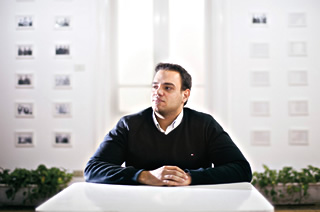 |
| Flat6Labs ceo Ramez Mohamed has overseen the company’s incubation of 36 startups with loans from $10,000 to $15,000, in exchange for which Flat6Labs received 10-15 percent ownership. |
Meanwhile, the Jordanian monarchy is placing bets on similar success stories beginning with the launch, shortly after Toukan’s watershed sell-off, of Oasis500. Established in 2010 with the backing of King Abdullah, Oasis was given a mandate to mentor, invest and help launch 500 regional startups over six years.
With its colorful wall murals, futuristic furniture and even an adult slide that spirals through a large atrium, the Oasis building in Amman is every bit the dotcom space one would expect. In addition to providing coaching and co-working office space for young firms, Oasis has a $6 million fund from which it invests up to $30,000 in startups in exchange for a 10 to 20 percent ownership stake.
So far, Oasis has invested in 70 startups and trained an additional 1500 entrepreneurs through its monthly “bootcamp” workshops, according to the investment manager Salwa Katkhuda. One of its first successful exits has been the online sports retailer Run2sport, which sold a majority of its stock for $2.5 million to Toukan’s Souq.com. Another Jordanian startup, online-payment gateway Madfoo3atCom, raised more than $500,000 from private investors. Both deals took place in 2012 and Katkhuda says Oasis is now expanding into the United Arab Emirates (uae) and Saudi Arabia.
“We are at the very beginning of an entrepreneurial era in the region, but it will take a long time for the market to mature,” she says. “The early players have a huge advantage and opportunity by being the first risk-takers.”
 rominent among those early risk-takers is Ahmed Alfi, who after nearly two decades as a media and technology investor in Los Angeles returned in 2006 to his native Egypt to launch one of the region’s first venture capital funds. In 2011, he opened Flat6Labs, which offers services for startups similar to those offered by Oasis500. So far it has graduated 36 companies, and it offers facilities and loans from $10,000 to $15,000 in exchange for 10 to 15 percent ownership.
rominent among those early risk-takers is Ahmed Alfi, who after nearly two decades as a media and technology investor in Los Angeles returned in 2006 to his native Egypt to launch one of the region’s first venture capital funds. In 2011, he opened Flat6Labs, which offers services for startups similar to those offered by Oasis500. So far it has graduated 36 companies, and it offers facilities and loans from $10,000 to $15,000 in exchange for 10 to 15 percent ownership.
“There’s quite a few breakthroughs that will happen this year,” Alfi says from Cairo, where he is busy giving a tour of the facility. “A lot of companies are on the cusp.”
Among the Flat6Labs success stories is Instabug, an application that helps developers find and report programming bugs through physically shaking a mobile device. Developed by a pair of Egyptian 22-year-olds, the app was partially funded by a Kickstarter campaign that surpassed its goal of $10,000 within hours, raising a total of $85,000 and now celebrating its millionth download. Then there is 1Sheeld, a device that can help automate objects and appliances, which won the audience-choice award at last year’s TechCrunch Europe Disrupt event, and Kngine, which Alfi says is similar to Apple’s automated voice assistant, Siri.
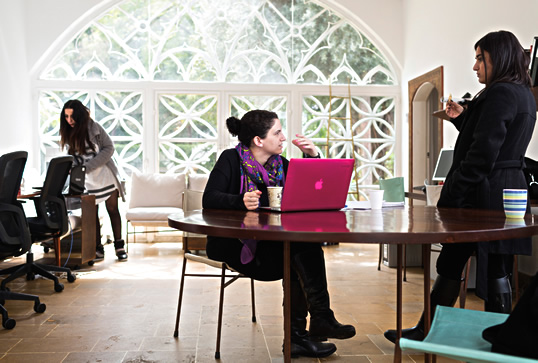 |
| Swimmer and engineer Hind Hobeika, 26, invented high-tech swim goggles, called Instabeat (below, right), that allow swimmers to track their heart rates throughout each workout. |
“We are finally getting outside firms interested,” he says, naming Samsung Ventures and Vodafone Ventures as parties negotiating potential deals.
Following on the success of Flat6Labs, Alfi is now expanding. He is building Egypt’s largest technology park by converting nearly an entire city block of buildings that were formerly used by the American University of Cairo. Known as “Greek Campus”—which comes from its original use as schools for Greek expatriates—Flat6Labs has already attracted 20 companies that have moved into one building, while four more buildings are planned to open this summer with the goal of attracting hundreds of companies and creating some 3000 jobs. Alfi says the word is getting around quickly.
“People were coming up to us when we were moving in, as we were doing construction. Eighty percent of the companies I had never heard of before. These are not even people who knew me,” he says excitedly. “These are people who wanted to be part of the community.”
The idea is to create a campus environment, where innovation and talent can spread quickly, which has been a major challenge for the Arab tech industry. “Everybody knows my main goal is collaboration, and collaboration will accelerate the development of the tech sector,” Alfi says. “Networking is one of the major missing components. If you are building something and you meet somebody who has already made subcomponents, you can collaborate. Networking is an educational tool to learn what other people are doing. Networking helps create teams faster to attack problems faster.”
But once teams are built, regional entrepreneurs, particularly in a place like Cairo, face the additional challenge of turning profits in a region with generally high unemployment, low per-capita incomes and low levels of disposable income. In Egypt, the Arab world’s most populous country, fewer than 10 percent of the population have bank accounts, and among the entire Arab world population of 350 million, fewer than 10 percent own credit cards.
Not surprisingly, many tech firms are looking to the Arabian Peninsula, where salaries are higher and growing consumer markets are more lucrative.
 lans by Jordan’s Oasis500 to expand into both the uae and Saudi Arabia this year will enable it to “serve a much larger market,” according to investment manager Katkhuda. ArabNet has also begun targeting the Gulf with new annual conferences in both Dubai and Riyadh.
lans by Jordan’s Oasis500 to expand into both the uae and Saudi Arabia this year will enable it to “serve a much larger market,” according to investment manager Katkhuda. ArabNet has also begun targeting the Gulf with new annual conferences in both Dubai and Riyadh.
Meanwhile, Flat6Labs has already graduated six firms from its recently established accelerator program in Jiddah, Saudi Arabia, and it has five firms enrolled in a new cycle. Flat6Labs Director Ramez Mohamed is bullish on the Gulf region. “Our main focus will be in the Gulf over the next year,” he says, disclosing plans to open yet another accelerator program in the uae as well as a branch in North Africa.
“Our perceptions about the Saudi market were wrong,” he admits. “We thought they wouldn’t be able to start successful companies or lack passion or qualifications, but these were all proven false. When we went there, we found entrepreneurs very eager to succeed and they had something really presentable on demonstration day.”
Alfi concurs. “Saudi youth are coming up with good ideas, more importantly, a desire to succeed,” the Flat6Labs chief says.
Indeed, Saudi talent has gone internationally viral with the success of media startups like Telfaz11, which produced a satirical spoof of Bob Marley’s “No Woman, No Cry” late last year that earned 11 million YouTube views. It has also produced dozens more high-production-value videos, animations and short films, with many on the site garnering up to three million views and hundreds of thousands of subscribers for its webisodes.
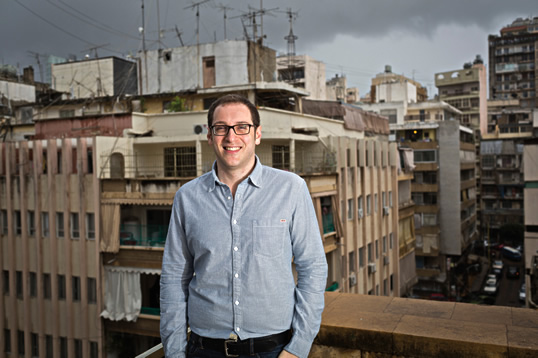 |
| 30-year-old Yale graduate Omar Christidis is the founder and director of five-year-old, Beirut-based ArabNet, which has brought together hundreds of it professionals, venture-capital investors and young entrepreneurs in conferences and events across the region. |
Prominent Saudi investor Rachid Al Balla says he is proud of young Saudi creatives and the “geek societies” that have emerged, such as Riyadh Geeks, Jiddah Geeks and Banat [Girl] Geeks. The challenge, he says, is to harness and mature their skills to help build an entrepreneurial ecosystem. Some of the groups have up to 2000 members, he explains, but they often lack the grassroots organizing or funding to meet and create
networking opportunities to form a more solid community. “There is no venue large enough for them to meet,” he explains. “They are free organizations.”
While governments in the region are spending billions on transportation infrastructure such as railways and financial cities, Al Balla argues that many of these projects target established business that can afford high rents, and thus they are not often suited for young entrepreneurs. He suggests a need for more community spaces, perhaps subsidized by sponsorships.
Al Balla says too often there is skittishness about spending and waste and a fear that government programs will overlap.
“When you invest billions, there will be waste and repetition, but that’s okay,” he notes. “In Korea, for example, you’ll find hundreds of programs competing with each other for the same objective. Over-irrigating is less risky than under-irrigating.”
Another challenge is the high salaries paid in Saudi Arabia and other Gulf states, which he says may create a disincentive for young professionals to take risks: “If you are making $10,000 per month, why would you work for a startup and leave at 10 o’clock at night, when you can leave in the early afternoon?”
“I don’t think there is lack of liquidity,” he says. “There are trillions of dollars. There’s a lack of maturity among investors, entrepreneurs, regulators. What needs to be done is to create an ecosystem.”
It’s high time, he asserts, for regional telecom companies that are already making billions to invest in the sector. “If an ecosystem does not mature fast enough, it’s going to be given to international companies who will set up shop here.”
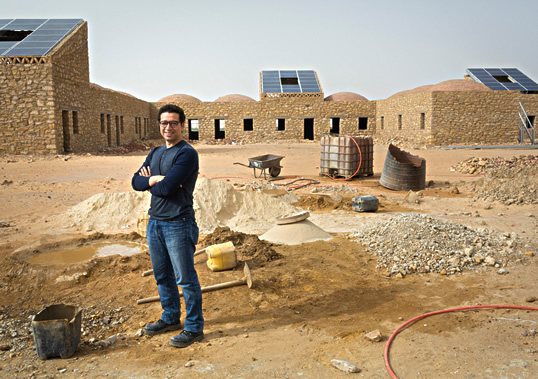 |
| For Ahmed Zahran, the future of economic growth is “off the grid” in the swaths of the Middle East not served by national electricity networks. In 2011 he cofounded KarmSolar, which is building one of the world’s largest solar-powered water pumps and aims to bring renewable energy to desert farming and tourism across the Sinai Peninsula. |
 rom his offices in the heart of Dubai’s new financial district, Toukan looks down at the rows of towers that line the city’s main thoroughfare, Shaikh Zayed Road. Though there are no exact figures, he estimates the current value of the Arab tech industry to be worth the equivalent of a couple of the $100-$200 million skyscrapers below.
rom his offices in the heart of Dubai’s new financial district, Toukan looks down at the rows of towers that line the city’s main thoroughfare, Shaikh Zayed Road. Though there are no exact figures, he estimates the current value of the Arab tech industry to be worth the equivalent of a couple of the $100-$200 million skyscrapers below.
“If only one percent of what is spent on real estate would go into technology investments,” he laments. “Investors are used to traditional investments. Tech is new to them. We need to prove it. Over the last 10 to 15 years, I have done a lot of convincing. I can see things changing. In the beginning people didn’t believe at all in what we were doing, but when they start hearing about things like WhatsApp being sold for $19 billion, I mean this all helps,” he exclaims with a laugh.
Though there are new funds coming online, such as Saudi telecom-giant stc’s launch of a $50-million fund to invest in small- and medium-sized businesses, Toukan says this is not enough. “We should be talking about billions not millions.”
Alfi says the pool of major investors, known in industry-speak as “angel investors,” needs to broaden: “The people of my generation—myself, Fadi Ghandour, Samih Toukan—these people are not that many. If there were a few hundred of us, the sector would move a lot faster. So now Fadi funds 50 companies, I fund 50 companies, but if there were hundreds of us it would be fantastic. Hopefully in the next 10 to 15 years, the new generation of entrepreneurs will be playing our role but for a much broader sector.”
Another challenge cited by Toukan, Al Balla and other investors is the difficulty of mobilizing talent in the region with the complications of visas procedures, particularly in Saudi Arabia.
On the other end of the spectrum, while poorer countries like Lebanon may be more desirable and accessible destinations, they are beset by massive infrastructure challenges.
Despite the buzz over Beirut’s new Digital District, Internet connections in the country remain among the world’s slowest. The government has promised to deliver discounted fiber optics to such facilities as Berytech, an incubator and one of the first tenants in the district. Berytech has a $6 million fund to invest in startups, and it accelerates three firms per year. But so far the facility has obtained just 12 megabits per second of bandwidth that it must share among dozens of tenants, resulting in individual speeds that hark back to late 1990’s dial-up era. And yet the costs of even this minimal service are staggering.
“We pay $12,000 per month for 12 megabits,” exclaims Berytech Director Nicolas Rouhana. “How am I supposed to help entrepreneurs if I pay that much?”
 eanwhile, the poverty of crumbling neighborhoods like Khandaq al-Ghamiq—visible from the windows of Berytech and the Digital District—is an aching reminder of the deeper challenges of job creation, both in Lebanon and across the region, where the World Bank estimates 100 million jobs will be needed in the coming decade to absorb new workers.
eanwhile, the poverty of crumbling neighborhoods like Khandaq al-Ghamiq—visible from the windows of Berytech and the Digital District—is an aching reminder of the deeper challenges of job creation, both in Lebanon and across the region, where the World Bank estimates 100 million jobs will be needed in the coming decade to absorb new workers.
As suggested by the title of his 2013 book, Startup Rising, writer and investor Christopher Schroeder argues that the new generation of Mideast entrepreneurs is poised to have a sweeping impact on the region and its economic future.
“Technology offers an irreversible level of transparency, connectivity and inexpensive access to capital markets unprecedented only five years ago,” he writes.
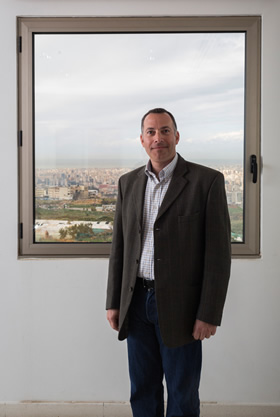 |
| Early tenant in Beirut’s newly established Digital District, Nicolas Rouhana is director of Berytech, which has a $6 million fund to invest in startups. |
The product of a year of traveling throughout the region, Schroeder’s book is a catalog of the dozens of startup successes across the Arab world. He makes frequent reference to the potential of the region’s youth population of 100 million under the age of 15, and Internet and smartphone penetration growing at double-digit rates in many countries. Convinced of the industry’s future, Schroeder now sits on the boards of both Oasis500 and Wamda, a Beirut-based tech-news agency and organizer of entrepreneurial workshops from Casablanca to Doha.
“The youth, well-educated and unleashed, are really an asset. Entrepreneurship generally, and tech availability specifically, offer us tools and capabilities not even on the table to discuss five years ago,” he wrote in an email.
Yet at the same time, it’s hard to deny that a great number of the industry’s young stars come from privileged backgrounds or have attended prestigious universities, often in the West, and that they are generally comfortable in English. In fact nearly every session and speaker at ArabNet in Beirut spoke entirely in English, despite the fact that 80 percent of the Arab population speaks only Arabic, according to the United Nations 2005 Human Development Report.
And entrance into the industry is not cheap. A single desk at facilities like Oasis500 or Berytech rents for a starting price of $300 to $350 per month, which is about the same as a discounted youth entrance fee to a three-day ArabNet conference. This may not seem expensive in the West, but these numbers are roughly equivalent to or greater than the average monthly salaries in much of the Middle East.
In response, organizations like ArabNet and Oasis500 say they offer scholarships and massive discounts to financially challenged individuals with compelling applications.
“There are a lot of ways to get in if you can’t afford the fees,” says Omar Christidis, ArabNet founder and director. The 30-year-old Yale graduate notes that all who participate in the Ideathon pitching session receive free event access.
“In theory, most of the opportunities are open to anyone regardless of class,” he explains over a choppy Beirut Skype connection. “Now does education play a role in filling out the application form? Yes.”
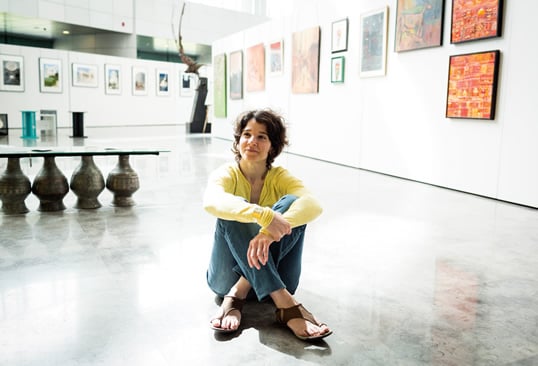 |
| Saudi national Joumana Al Jabri cofounded Beirut-based Visualizing Impact, which produces data and graphic-based storytelling to map out Middle East social and political challenges not covered in depth by news media. “There’s a lot of talent in the region and it’s not being utilized in areas that need it most,” she says. “Our ambition is to create a precedent that can both address pressing issues and engage highly creative people in data-science technology and design.” |
And Christidis acknowledges that many of the region’s youth may not have the luxury of experimenting with entrepreneurial ideas due to commitments to earn a living. “If you are a breadwinner for your parents, you may be less likely to take the risk,” he adds, while cautioning that these same digital divides characterize most world tech markets. “Is entrepreneurship in Silicon Valley catered to those with little means?”
Industry veteran and Aramex ceo Fadi Ghandour says he too is aware of the divide, and he touts a new partnership with the United Nations Development Program to help fund 200 microbusinesses in Jordan. The initiative, which Ghandour says will also be extended to Lebanon, is offered through Ruwwad, a youth empowerment and volunteering organization that he also chairs.
“The Internet abolishes divides, and it is an equalizer and has brought down the cost of innovation and doing business substantially,” he says. “So the divide exists, but that does not worry me as much as red tape, access to capital and building the infrastructure for enabling people and businesses to transact online.”
Indeed, those worries may also endanger the Arab world’s ability to retain the precious talent it has built. For example, young hardware developers like Hobeika of Instabeat are weighing options for future locations.
“I think we will have a lot of trouble scaling in the future when we want to create more than one product,” she says. “We’ve been looking into relocating, places in Europe, in the us. We are definitely exploring. You want to hire senior people and high-level expertise.”
Sitting in a Beirut café, Bassam Jalgha, the creator of Roadie Tuner, is also torn, facing his next trip to China to oversee the first production cycle. “I want to give hope to people, to tell them it is possible, that we are doing it, even if the situation is bad, that you can still do it.” But as car bombs continue to go off in Beirut, he has been considering spending more time in China, and he is learning Chinese. “I like it,” he says wistfully. “The sad part about being here is nothing is getting better. I came back after six months in China and now it’s worse.”
And time is of the essence. Governments and institutions that constrain investment or opportunities now are making “terrible choices” that may affect generations, author Schroeder argues. “Technology moves so fast,” he says. “If a country falls behind, it is hard to catch up. They will lose their best talent.”
But Ghandour remains confident for the longer term: “I understand the risk very well, and I know the rewards. Profits are important, but this industry needs to be built and nurtured, and investors and entrepreneurs have to be very patient before pushing to see profits. Like all business or startups, everything takes time to build.”
Ghandour’s team at Wamda is now raising a $75 million fund to support entrepreneurs, a more than tenfold increase on Wamda’s previous $7 million fund launched just three years ago.
“The trends in all areas look good. Green shoots everywhere. We just have to keep pushing and pushing and continue believing and investing,” says Ghandour. ”Pathfinders are people that are going to take the biggest risks. They are the most courageous and most committed. Their work will be rewarded. History tells us that all the time.”
 |
Habib Battah (habib.battah@gmail.com and @habib_b) is a Beirut-based investigative journalist, filmmaker and author of the blog www.beirutreport.com. He is also a regular contributor to Al Jazeera, bbc World and The Daily Star newspaper. He is a two-time recipient of the Samir Kassir Press Freedom Award. |
 |
Cairo-based freelance photojournalist David Degner (degner@gmail.com) is represented by Getty Reportage. He studied philosophy and photojournalism at Western Kentucky University. |